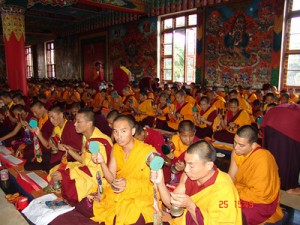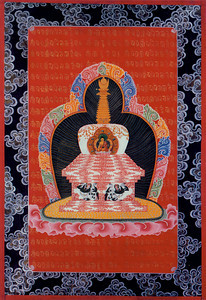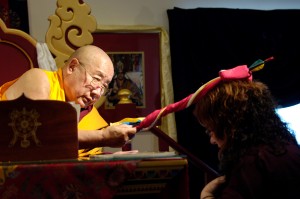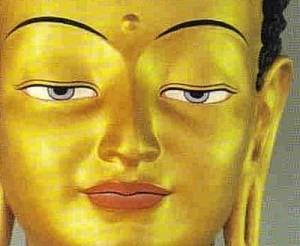
An excerpt from a teaching called Dharma of Technology by Jetsunma Ahkon Lhamo
I really hope from the depth of my heart that all of you really fully intend to accomplish Dharma. What comes to your mind when you think, “accomplish Dharma?” One of the dangers, I think, when you see monks practice in the traditional way, especially if they are really polished in their practice is that we think that must be accomplishing Dharma. We think that what accomplishing dharma is getting the hand movements right and looking very disciplined and very ordered and in sync. And it’s part of it. That is the mechanical part, the skill that is necessary. Pujas and practices, all the different kinds of practices, whether they are recitations of different kinds, the making of tormas to all of the different kinds of offerings that you would make, to accomplishing tsog properly, to doing the mudras properly. These things are all the technical side of practice and they’re all important.
There is a reason why they are in the practices that we do. They all have a specific role to play in ripening the mind. And one of the things that makes tantra tantra, is that there is this outer, inner and secret level of meaning and that there is actually a physical thing that you do in order to accomplish what you’re doing, such as making a torma or making a certain kind of food offering at the same time that you’re accomplishing on the inside. And they’re done together, hand in glove and one is meaningless without the other. Not completely in the sense that you can make an offering in your heart and if you don’t have anything physical to give, it’s still a valid offering, but still, it’s universal in the Vajrayana path that you do all these different things together. So it’s a great skill and it’s really good to learn these things and that’s part of accomplishing Dharma.
Don’t be overwhelmed by watching people play bells and damarus in sync. Don’t be overwhelmed by watching the different technical things that you can do in Dharma and think that if you could just learn to make your hands go smoothly and do all this stuff at one time or if you could learn all the different parts of puja and do them absolutely correctly, then you will automatically have accomplished Dharma. If you have any understanding of Dharma by now, you’ll understand that Dharma is in the heart.
If you have the heart of Dharma, then to accomplish the technical side of Dharma is extraordinary. If you could have both of these components, it’s extraordinary. It’s a tremendous blessing. It’s a blessing beyond description. On the other hand, if you have the heart of Dharma without the technical side, you still have the heart of Dharma and that heart remains with you. It’s not something that dies at this lifetime. It’s something that remains with you and it changes you and it brings about the results that you want. But if you only have the mechanical part of Dharma, if you only have that without the meaning, without the heart of it, then you come away unchanged, and there again you’re in danger of collecting these skills in a material way. And if you collect them in a material way, it will be like any other form of materialism. It has the danger of pride, it has the danger of greed, it has the danger of lots of different things.
Now hear me. I am not saying that you should not become proficient in accomplishing these physical parts of Dharma, but I’m saying that if you do, be certain that you don’t lose an inch, a centimeter of your understanding of what Dharma is and in fact, be sure that your understanding of the heart of Dharma increases accordingly.
I’m not saying don’t bother to learn the technical side. I hope from the depth of my heart that we can learn the technical side. I really encourage all the monks and nuns to learn the technical side of Dharma, but I warn you not to do it without the heart.
In truth I have to tell you there have been one or two of you doing the offering mudras every chance you get and I see that there is no concentration and no real fixation or stabilization of your mind so that as you do the mudras you remember that you’re actually making an offering to the Buddhas and the bodhisattvas or an offering to the specific deity. I think that’s sad. I think it’s sad if you pay a lot of attention to what your hands are doing and very little attention to what your heart is doing. I think that’s kind of like a shell. Do you see what I am saying? So I think it is very important for you to accomplish Dharma from the heart.
When I say “from the heart,” I don’t mean in an emotional way. I don’t mean that you should think about Dharma in such a way that you make it into a vast, blissful experience. It isn’t like that at all. The real heart of Dharma is compassion and it’s the very hardest part. If you had a teacher that sat there beside you, you could learn all the different parts of Dharma practice and you could learn them very well. Relatively speaking, even though there is a lot to learn and even though we’re actually technically too old to start now and learn it all. But even if we could, we could accomplish it sufficiently to be pretty good at it or to look pretty good at it.
From that point of view, that kind of accomplishment is relatively easy. It’s doable. It’s doable to anyone of normal intelligence or perhaps a little bit above. But the heart of Dharma – if you sat with a teacher and yet you were not receptive or you had any of the karmic obscurations that I have described in previous teachings, it may be that you could sit with an excellent teacher for many years and never accomplish the heart of Dharma, which is compassion. Of all of the things that you can practice in Dharma, compassion is the very hardest. As a monk or nun, you can keep your vows exactly. You could read them every day and you can measure your bed and you can never clean a toilet again in your life. You could do all these things that would keep your vows exactly. But I bet anything if you examined your heart, you have not kept the bodhisattva vow for one hour.
Copyright © Jetsunma Ahkon Lhamo. All rights reserved








